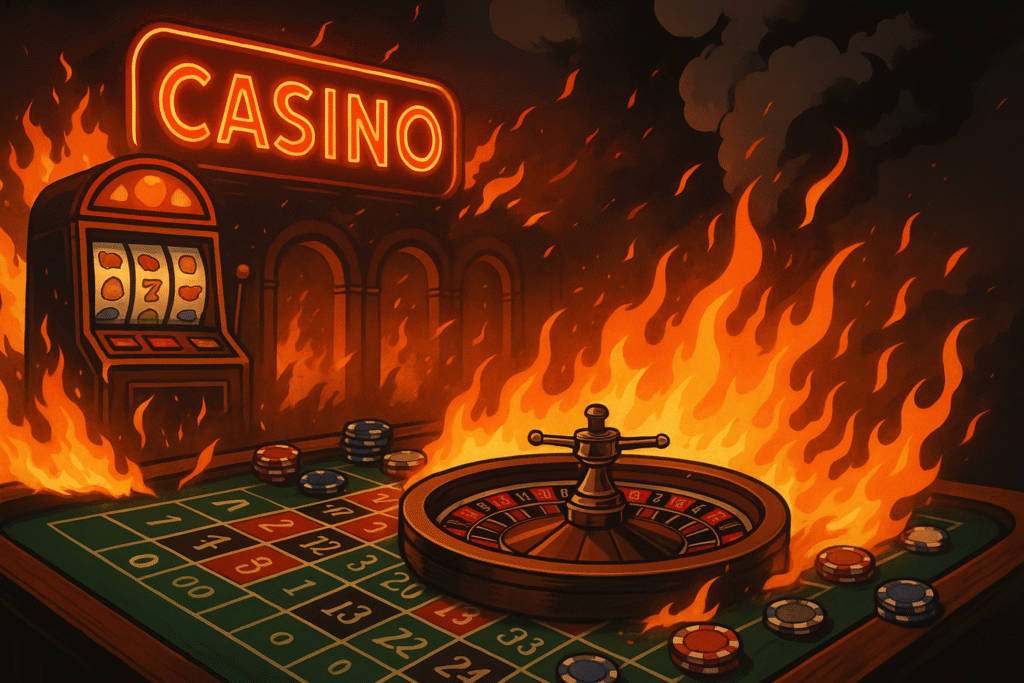
Self-Exclusion Schemes Fail Vulnerable Gamblers
A recent BBC investigation has exposed significant failings in self-exclusion schemes designed to protect problem gamblers. The report found that the vast majority of Adult Gaming Centres (AGCs) visited by an undercover reporter failed to prevent him from gambling, raising serious questions about industry practices and regulatory enforcement across Britain.
An undercover reporter who had self-excluded was denied entry at only one of the 14 venues he visited.
There are nearly 1,500 adult-only gaming centres in Britain. These venues feature high-stakes slot machines where players can spend up to £2 on a single spin, with games lasting just a few seconds. With potential pay-outs of up to £500, these fast-paced and noisy machines are a significant draw, but critics argue they disproportionately target the UK’s most vulnerable communities.
To combat addiction, individuals can voluntarily join a self-exclusion scheme. This involves registering with a venue, providing a photograph, and having their details shared with other AGCs in the area. If a registered person attempts to enter one of these premises, staff are required to intervene and ask them to leave. However, a BBC investigation in Portsmouth, a city with a high concentration of AGCs, revealed this system is often not working. An undercover reporter who had self-excluded was denied entry at only one of the 14 venues he visited.
- What? A BBC investigation found that self-exclusion schemes for problem gamblers are being ineffectively enforced at Adult Gaming Centres. These schemes are a core part of the industry’s social responsibility measures.
- When? The findings were revealed in a recent report. The issue of gambling harm is ongoing, with these failures highlighting a current, critical gap in player protection.
- Who? The investigation involved a BBC undercover reporter, Adult Gaming Centres, problem gamblers seeking help, and regulatory bodies like the Gambling Commission. Experts like Dr Matt Gaskell and politicians like Sir Iain Duncan Smith have also weighed in.
- Where? The undercover report focused on 14 venues in Portsmouth, but the findings have implications for the nearly 1,500 AGCs operating across Great Britain.
- Why? The failures appear to stem from a lack of staff training, inadequate enforcement by venues, and potential loopholes in the system. The BBC learned two of the premises visited were not signed up to a scheme at all, a breach of their licence.
- How? An undercover reporter, who was officially registered with a self-exclusion scheme, was able to enter and play on slot machines in 13 out of 14 venues for extended periods without being identified or challenged by staff.
So what does the all mean?
- This breakdown in protection means that vulnerable people trying to control their addiction are being let down, leaving them exposed to further financial and psychological harm. It undermines the credibility of industry safety measures and has prompted the Gambling Commission to launch its own investigation. As consultant psychologist Dr Matt Gaskell stated, these venues may be targeting “the most vulnerable people in our communities who could least withstand the harm”. For more information, you can learn more about UK gambling regulations.
For those affected, the consequences are severe. Tracy Page, 51, described the schemes as ineffective, stating, “It fails, there are too many gaps, too many loopholes and I don’t believe staff have got the knowledge or the training to be able to say you need to step away.” This personal experience underscores the urgent need for reform.
Sir Iain Duncan Smith, chairman of the All-Party Parliamentary Group for gambling reform, called for greater powers for local authorities and the Gambling Commission to intervene.
“Most of all we do need to see inspections of those properties… for just checking that what they’re actually doing is what they’re meant to do, and they’re not doing stuff which is marginally illegal.”
The Gambling Commission described the findings as “very concerning”. Tim Miller, its executive director, confirmed the onus is on the operators.
“Where we see evidence that gambling companies are not meeting their regulatory expectations will take really robust action against them… The onus is absolutely on the gambling company and the people within it to spot that individual.”
Conclusion
The investigation’s findings paint a troubling picture of the state of player protection in Britain’s Adult Gaming Centres. The failure to enforce self-exclusion schemes is not just a procedural oversight; it is a direct threat to the wellbeing of vulnerable individuals. With regulators now investigating and politicians calling for action, the pressure is mounting on the industry to ensure its safety measures are more than just promises. For those struggling, it is vital that robust and reliable support systems are in place. If you have been affected by these issues, you can find support for problem gambling.